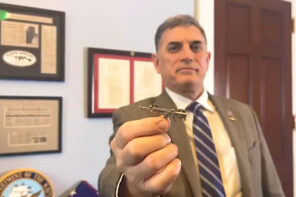During the Tribeca Film Festival, director Kirby Dick stopped by the Direct TV Press Center to participate in a roundtable to discuss his documentary Outrage. As reported earlier on Religion Dispatches, Dick maintains that his film isn’t about outing all public figures but rather exposing the hypocrisy of closeted homosexual politicians who discriminate against their fellow gays and lesbians. Following are excerpts from that roundtable.
How did you get the idea for this film?
Initially, I was in Washington DC in August 2006 promoting my last film, This Film is Not Yet Rated, about censorship within the MPAA rating system. I realized that I only knew this story because I work in the film industry; the rest of the country didn’t know it. So, I thought there must be many stories in DC inside that only people inside the Beltway know. I started asking around and very quickly, people started telling me about these closeted politicians, who were voting anti-gay.
Do you prefer that a gay politician is outed or comes out his own?
I would much prefer that a gay politician come out on their own, even if there’s some pressure for them to do that. When it rises to the level of hypocrisy of what the politicians that I profiled in the film have done, then I think it should be recorded way or another.
How did you choose the subjects that you focused on?
We were looking at subjects over a 25-year span, and we choose those subjects we could get corroboration on. There are other people that are probably gay that rise to this level of hypocrisy, but there wasn’t the level of information out there for me to report on it. I really wanted to get the story right.
How hard was it to get people to go on the record?
Some people were very concerned. A congressman has a great deal of power in their district. These people may have grown up in the district and all their business and personal relationships are there. They feel that they can suffer some serious consequences if they speak out. In a number of cases, someone would start an interaction with me and then go, “Look. I can’t even speak with you.” They didn’t even want to go off the record.
Have you received any backlash from some of the subjects profiled in the film?
So far, there hasn’t been any backlash. These are very savvy politicians and they got to where they are by ignoring this issue. I would be surprised if they responded.
Can you talk about Hilary Rosen and Elizabeth Birch’s reactions to Mary Cheney’s silence on the issue of same-sex marriage?
They were really outraged because here was someone who was so close to the presidency and chose not to speak out. Mary Cheney is a very capable and persuasive woman who ran a very pro-gay campaign for Coors Beer. She helped Coors open up a whole new market. Why didn’t she use that skill to help at least slow down the hysteria that was coming out of the Bush-Cheney administration?
What relationship do you see between how the Catholic Church as an institution handled the issue of closeted homosexual predators, and how these closeted politicians are predators in a different way toward the very people they themselves are?
There is an element of the arrogance of power. The Catholic Church thought they could get away with it. Likewise, these politicians are at this level of power where they feel they can continue to live this lie and get away with this hypocrisy because no one is going to challenge them. So far, they’ve been right. The mainstream media certainly profits by having close relationships with these people. In fact, it helps them do their reporting. But the tradeoff is that sometimes they don’t report about this hypocrisy.
What role do you see religious right playing in this debate?
At one point I wanted to make a film on these efforts by the conservative elements in each denomination to take over their denomination around the issue of gay rights because it’s a real strategy that’s being used. Certainly the religious right has an agenda but I put more blame on the Republican party, which really didn’t have a personal agenda. But they made this calculation to cynically use the religious right in order to maintain power. As [gay Congressman] Barney Frank (D-MA) says in the film, in the seventies, Democrats and Republicans were about equal on gay rights. What you saw over the ’70s and into the ’90s was that the Republicans, who had no problems with gays and lesbians and in fact had a number of homosexual friends, made a political calculation that they were going to go after gays and lesbians in order to maintain and gain power.
Why didn’t you include more Democrats, cabinet members, and UN members?
We looked at a wider range of subjects, but again the issue was could we get the substantiation. But we were also looking at people at a certain level of power. Mike Rogers of BlogActive.com has at times outed staff members, and we decided that was not something we were going to do.
What kind of public exposure do you want for this film?
Obviously we’d like it to go as wide as possible. I encourage multiple reactions to this film because this is just my perspective. I hope it generates a discussion so that these issues can be worked out in a public forum. If people have a difference of opinion, let’s widen this discussion by having it in public and not through just the blogosphere.
I hope that this film encourages the mainstream media to talk about this. The reason the closet exists in large part is because the mainstream media has not written about this. In many ways, we’re standing on the shoulders of the gay press, which has written about this for years. You can see a lot of them in this film. Once this issue gets discussed, it’s much harder for the closet to exist. What happens is that politicians make the decision to go in the closet early in their career before they are elected to office. They think this is a strategy that’s going to work because it’s not written about. Once this is film is out there and this is discussed, perhaps politicians will say this is the wrong decision, personally and politically. I really hope that one of the impacts of this film is that in twenty years, the closet will be a minor factor in politics.
Outrage is now playing in selected cities. Check the Web site for additional information.




